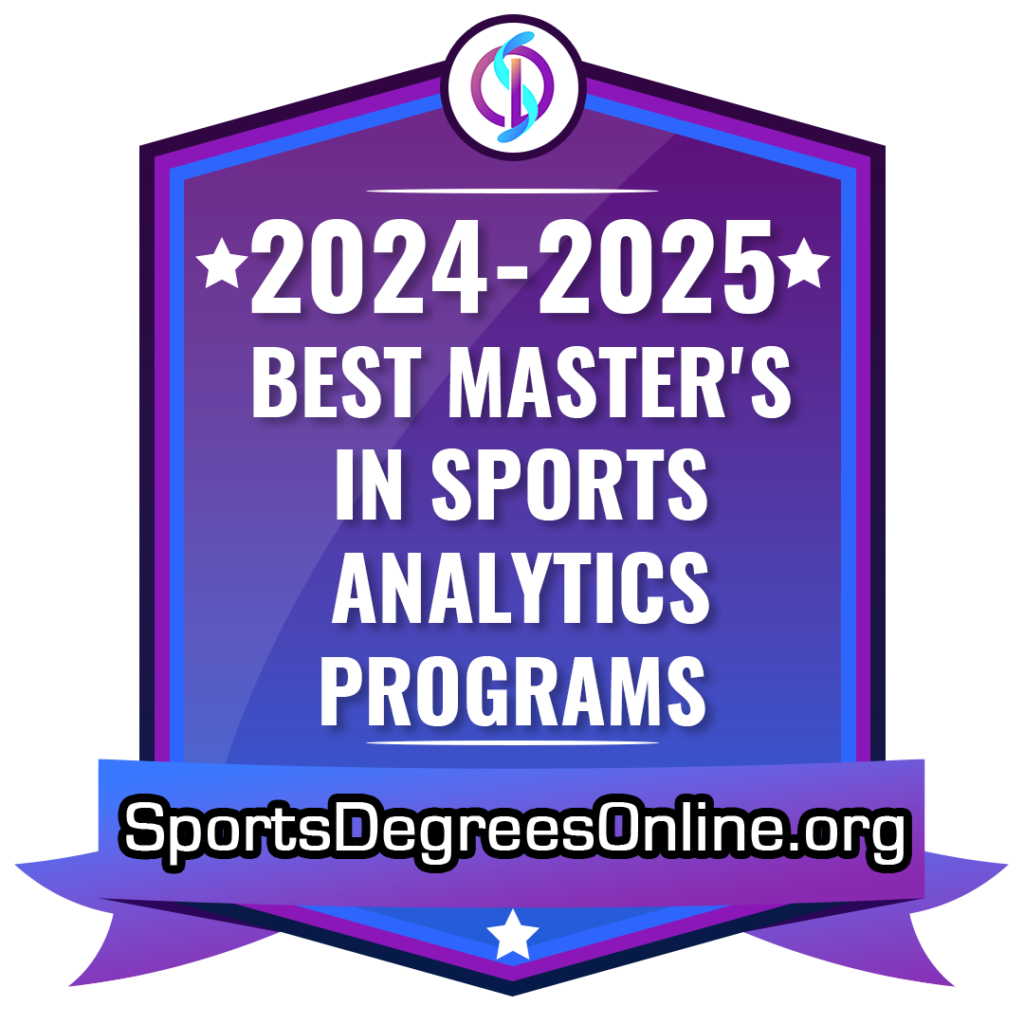Last Updated on February 29, 2024
Master’s in Sports Analytics Guide 2024

The Best Sports Analytics Master’s Programs in 2024
According to Sports Degrees Online’s strenuous ranking criteria, Northwestern University’s Sports Analytics Program has earned our top ranking for 2024. Northeastern University’s program earned a close second, with deep connections to Boston’s legendary sports industry. The University of Mississippi earns top marks in terms of value, delivering impressive quality at a reasonable cost of $13,669 – significantly less than the rest of Sports Degrees Online’s top ten university programs.
Whether you dream of being a key part of a front office or achieving success in the business of sports, you will be hard-pressed to find a more valuable skill than data and sports analytics. Managers, directors and executives are increasingly expected to understand the fundamentals of sports analytics, and this trend is certain to continue. For these reasons and more, students and aspiring sports industry professionals should strongly consider pursuing a master’s degree in sports analytics.
In this guide…
Why Study a Sports Analytics Degree?
Sports Degrees Online’s 2024 Master’s in Sports Analytics Program Rankings
Which Sports Analytics Degree Is the Best Fit for You?
Sport Analytics Degree Courses
Sports Analytics Clubs & The Value of Extra-Curricular Work
Career Opportunities for Master’s in Sports Analytics Graduates
A Brief History of the Field of Sports Analytics
Sports analytics has emerged from the shadows of the back office and become a critical part of decision making at every level. Data-driven approaches have transformed the decision-making processes for every sport and sport-related business around the world, from the English Premier League to the UFC.
Modern sports have always had hobbyist statisticians. For generations, fans have obsessed over batting averages, ERA’s, passing yards, touchdowns, goals, and other statistics of their favorite athletes and teams. Whether it be pouring over statistics charts in the newspaper or more recently on niche websites, data has been a big part of the fan experience.
Businesses and organizations across the sports industry need data analysts to help them derive as much value from the troves of data at their disposal. This is where the sports data analysts come in, and why this skill set has become indispensable.
Why Study a Master’s in Sports Analytics Degree?
The demand for these advanced statistics has exploded in the last decade for myriad reasons, but the modern-day revolution was ushered in by Billy Bean and immortalized in the movie Moneyball. Following the path that Moneyball helped to blaze, pioneering front offices, fantasy sports, the gaming industry, and a culture hungry for information have changed the sports analytics landscape forever.
In today’s world, this same approach is now applied everywhere, on and off the field. Decisions related to marketing, fan engagement, partnerships, strategy and basically every other aspect of a business are driven by analytics. Graduates with a sports analytics degree who are able to combine in-depth knowledge of sports with an understanding of how to apply state-of-the-art data analysis techniques will find themselves incredibly marketable to a wide array of sports organizations.
Click here to skip the rankings and continue reading the Master’s in Sports Analytics Degree Guide

Best Sports Analytics Master’s Programs
Sports Degrees Online has created the most thorough Sports Analytics Degree Rankings to help our readers find the best programs out there. Our matrix includes a variety of criteria including faculty expertise, curriculum, internship opportunities and networking opportunities, graduation rate, and more. We hope this list will be a key resource as you search for which program suits you best.
#1
Northwestern University
Location: Chicago, IL
Program: Master of Sports Administration, Sports Analytics Concentration
Credits: 33
Tuition: $45,696
Details: Northwestern’s Master’s in Sports Administration, Sports Analytics Concentration is a program for those who are looking for a foundation of future success in the sports industry while specializing in Analytics. Northwestern has a well-earned reputation for quality, and the networking components of the program, including MSA Student Leadership Council, provide students with unparalleled opportunities to connect with professionals and alumni throughout the sports industry. This is a well-rounded Sports Administration program that allows students to hone their data analytics skills through the context of sports and should be a strong consideration for students who are serious about succeeding in the sports industry. The quality of the faculty who contribute to this program are top notch, and Northwestern’s alumni network is an invaluable asset for all graduates throughout their professional journey. The program only features four analytics-specific courses, which might have students hoping for more looking elsewhere.
#2
Northeastern University
Location: Boston, MA
Program: Master of Sports Leadership, Concentration in Analytics
Credits: 45
Tuition: $38,300
Accreditations: COSMA
Details: Northeastern’s Master of Sport Leadership program is offered 100% Online with four different concentrations including analytics. With 45 credits, the intensive structure of Northeastern’s program offers students the chance to dive deep into their respective concentration. Specific to Analytics, this program offers students the chance to take up to six data analytics courses while also benefiting from the well-rounded structure of this COSMA certified Sport Leadership program.
Learn more about the degree:
#3
Stevens Institute of Technology
Location: Hoboken, NJ
Program: Sports Technologies and Digital Transformations Master’s Programs
Credits: 36
Tuition: $59,334
Details: Steven’s Institute of Technology offers three dual-degree programs which feature a Sports Tech component, allowing students to focus on the specialized skills needed for their preferred career path. For the purpose of Sports Degrees Online’s Best Sports Analytics program rankings, we considered the STEM designated Business Intelligence & Analytics + Sports Tech Dual Degree Program, which we found to be a unique sports analytics offering. With two on-campus semesters and a 5-week summer session in Madrid, this program offers students the unique opportunity to gain internship and networking experience abroad. For students seeking to build a skill set that will help them excel in Sports Analytics and Sports Tech, Stevens Institute of Technology is an intriguing choice. The curriculum core is built on data analytics, which is brought to life through the partnership courses and experiences offered through the Real Madrid Graduate School-Universidad Europea.
Learn more about the degree:
#4
American University
Location: Washington, DC
Program: Online Master of Science in Sports Analytics and Management
Credits: 30
Tuition: $42,810
Details: American University’s MS in Sports Analytics and Management is offered 100% online, making it an excellent option for busy professionals seeking to advance their careers. This program was one of the first programs offered in this field, and it was created by industry experts to develop specific skills lacking in other sport management programs.
#5
Samford University
Location: Birmingham, AL
Program: MBA, Sports Business Concentration
Credits: 45
Tuition: $42,615
Details: Samford University’s MBA program features concentrations in either Sports Business or Data Analytics, allowing students to allow students to complement their MBA with ideal skills to succeed in the sports industry. Samford University is home to the Center for Sports Analytics, which is housed on campus and allows students to get involved with real-world analytics projects. Samford has been on the leading edge of sports analytics research, making it one of the top destinations in the country for students who are passionate about this field.
#6
Temple University
Location: Philadelphia, PA
Program: Master of Science in Sports Business, Concentration in Sports Analytics
Credits: 36
Tuition: $39,600
Details: Temple University’s Master’s in Sport Business with a Concentration in Sport Analytics is a program that was designed for the executives and managers of tomorrow. Sport Analytics is one of four concentration areas offered in the Sport Business degree, so the makeup of each cohort varies. The Sports Analytics concentration was founded by a professor who spent time with the Oakland A’s during the Moneyball era.
#7
The University of New Haven
Location: New Haven, CT
Program: Master of Science in Sport Management, Business Analytics (STEM) Concentration
Credits: 36
Tuition: 27,628
Details: The University of New Haven’s M.S. Sport Management with a concentration in Business Analytics is a STEM-designated program that provides students with a strong foundation for success in the business of sports. The program features a mentorship program that pairs students with professionals from around the sports industry, allowing students a chance to get an inside look at the day-to-day responsibilities and the ins and outs of roles held by seasoned veterans in the sports industry. The University of New Haven’s program has extensive connections to sports organizations and companies in the region, and its easy access to the companies and organizations in the New York City area is a major selling point for this program.
#8
The University of Mississippi
Location: Oxford, MS
Program: Master of Science in Sport Analytics
Credits: 30
Tuition: $13,669
Details: The University of Mississippi’s new Master of Science in Sports Analytics program is unique in that it offers two concentration areas within analytics – Sport Business and Sport Performance – allowing students to build specific skills depending on their intended career track. The program is delivered 100% online, and there are five starting dates for the course each year, making it among the most flexible programs in terms of delivery to make our list. The heavy emphasis on data analytics and the ability to specialize in business or performance make this an intriguing option for professionals looking for a remote degree option.
#9
Marquette University
Location: Milwaukee, WI
Program: Master of Science in Sports and Exercise Analytics
Credits: 33
Tuition: $42,735
Details: Marquette University’s Master of Science in Sport and Exercise Analytics program is offered through the Department of Physical Therapy and allows students the chance to specialize specifically on athletes and performance. For those who would like to dive deep into the research aspect and work directly with athletes, this program is a top choice. Students enjoy access to Marquette University’s Motion Analysis and Biomechanics Laboratory as well as an exclusive relationship with Marquette’s athletic department, providing unparalleled research opportunities.
#10
Indiana University-Purdue University Indianapolis
Location: Indianapolis, IN
Program: Master of Science in Applied Data Science with a specialization in Sports Analytics
Credits: 30
Tuition: $39,780
Details: Indiana University–Purdue University Indianapolis is home to a Master of Science in Applied Data Science with a specialization in Sports Analytics. This program is an M.S. in Data Science at its core, yet the program features a selection of sport and event-specific electives that allow students to gain some specific, marketable skills that will prepare them well for a career in sport and event management. Based in downtown Indianapolis, the possibility of internship opportunities is strong.
#11
University of Oklahoma
Location: Norman, OK
Program: Master of Science in Sports Data Analytics
Credits: 36
Tuition: $38,012
Details: The University of Oklahoma’s Master of Science in Sports Data Analytics is a hybrid program offered through the Health and Exercise Science Department. Oklahoma’s program was designed to prepare students to work as data analysts with sports teams or prepare students for a Ph.D. research track. The program does offer a sport business course, but students will gravitate toward this program because of its focus on Performance and Exercise Science.
#12
Lasell University
Location: Newton, MA
Program: Master of Science in Applied Sports Science Analytics
Credits: 36
Tuition: $23,364
Details: Lasell University’s Master of Science in Applied Sports Science Analytics program was designed to be at the intersection of exercise science, data analytics, and statistics. This program was created with insights from professional sports teams and device manufacturers to ensure that the program graduates will be equipped with cutting-edge skills in this field for years to come. Lasell’s program is a solid option for those who would like to work at the forefront of cutting-edge strength and conditioning and technology.
#13
University of West Georgia
Location: Carollton, GA
Program: Master of Science – Sport Management, Concentration in Sports Analytics
Credits: 36
Tuition: 13,392
Details: The University of West Georgia offers its Master’s Degree in Sport Management with a concentration in Intercollegiate Athletics Administration and Sports Analytics. The program is delivered 100% Online, and the curriculum is well balanced to prepare graduates for a wide variety of career paths in the sports industry. The program features summer or fall start dates, and the tuition costs at the University of West Georgia are more affordable than most.
#14
Linfield University
Location: McMinnville, OR
Program: Master of Science in Sport Science and Analytics
Credits: 33
Tuition: $25,245
Details: Linfield University’s MS in Sports Science and Analytics program was created as a traditional exercise science program crossed with data analytics to help students prepare for the research, challenges, and careers of tomorrow. This program features a strong experiential learning component which includes opportunities for students to work with local athletes at every level, including high school, collegiate, and professional.
The professional sports industry in the United States alone accounts for billions in annual revenue, so it’s no surprise that cutting-edge data analysis and statistics are an increasingly fundamental component of professional sports.
Across the globe, organizations, leagues, and professional teams increasingly look for patterns from math and physics to determine strategy and the most efficient use of financial resources.
Sports analytics goes well beyond simple statistics. It involves organizations examining virtually every aspect of their operation through a number of different lenses. Sports Degrees Online recently interviewed Professor Erin Schliep, who is the Director of the Sports Analytics at the University of Missouri, and she explained the role of data analysts:
“From a statistician’s perspective, there are a lot of challenges to gain as much information from a data set as you possibly can. Our objective is to find information and tell a story from the data.”
Professor Erin Schliep, Mizzou
Analytics allows organizations and businesses to assess themselves from the top down in order to discover the very best version of themselves. By synthesizing and assessing data on a variety of levels, they can improve efficiency, profitability, and the competitiveness of a team or organization.
With a heavy foundation in math, computer modeling, and statistics, sports analytics is at the forefront of an approach that is now being adopted at a much wider scale across myriad industries. It combines elements of advanced remote sensing, data mining, accounting, computer modeling, and statistics. Despite its roots in such concrete disciplines, sports analytics is often considered to be both an art and a science as it informs decisions of every kind for sports organizations. Again, Professor Ted Hayduk explains:
“…in practice, statisticians and sport analytics practitioners tend to evaluate a model’s effectiveness using a number of methods, and many of those methods involve making tradeoffs… For that reason, selecting the best estimation procedure involves a great deal of critical thinking and sound judgement.
Ted Hayduk, Statistical Modeling and Sports Business Analytics
Broadly speaking, sports analytics can be separated into two disciplines: on-field and off-field metrics. On-field metrics include player fitness, tactics, environmental conditions, or anything else that will increase the competitiveness of a team on the field. Off-field metrics include player transfers, ticket sales, marketing, and anything else within the control of the back office to improve the profitability and bottom line of the organization’s business practices.
Technological advances – particularly in the processes of data collection – continue to generate an overwhelming amount of data that is growing exponentially. Sports Degrees Online recently interviewed Professor Darin White of Samford University, who put it this way:
“If you were to take all the data that has ever been created since the world began and put it in one big warehouse, ninety percent of what is in that warehouse has been created in the last twenty four months… And it’s not slowing down. It’s exponentially increasing, and there is so much technology around us all the time with our wearable devices and phones, it’s unbelievable just how much data is being generated. This isn’t just in sports, this is in all industries. They are literally drowning in data but they don’t know how to derive that data. So that’s where [analytics professionals] come in.
Darin White, Samford University
From dynamic heat maps that show where a soccer midfielder has run over the course of a 90-minute match to a heart-rate graph of a basketball player resting for the 4th quarter of a playoff game–the examples of how sports analytics is changing the game abound. Professor Erin Schliep explains the different areas where sports analytics affect the game:
“You need to maximize each individual’s performance and maximize their collective behavior. If you’ve got five basketball players on the court, you want each person to be playing at their best and you want those five people navigating the court collectively at their best. There are a lot of moving parts here to be thinking about how you can optimize this. You have the strength and performance coaches trying to make sure these individuals are their best on game day. Then you have the coaches applying their tactics and strategy and making sure they are performing well collectively, as they set up their offensive or defensive positioning.”
Professor Erin Schliep, Mizzou
Subtle metrics like these are now considered key data points which factor into the bigger picture of winning games and staying profitable for every professional sports franchise.
Tangential to sports analytics, the sports gambling industry–with revenue approaching 150 million dollars a year in the US alone–has also had a significant impact on professional leagues. This entire industry of sports gambling is now driven by sports analytics and is growing across the globe with large gambling centers like Macau and Las Vegas and online gambling sites allowing action in nearly every single sporting event across the world.
With the sports industry, the gambling industry, and the lucrative world of fantasy sports, it is clear that the demand for sports analytics experts will continue to grow at a rapid rate for years to come.
Which Sports Analytics Degree Is the Best Fit for You?
There is a surprising amount of variation between different sports analytics master’s degree programs depending on which department it is housed in, who created the program, as well as different types of master’s degrees in sports analytics.
The majority of universities that offer a master’s in sports analytics program – or an MBA with a concentration in sports analytics – house the program in a business school. Many of these programs offer very specific courses in other areas including sports statistical analysis and sport and exercise science to varying degrees.
These programs generally place emphasis on the sports business side of the field, and how data-driven decision-making is happening in the business world. The evolution of phone apps, tracking, and social media are providing more information about the behavior of every customer and how they relate to teams and their sponsors. Combining analytics expertise with strong a business foundation sets graduates up for a strong future in the sports industry and well beyond with proficiency.
Some sports analytics master’s programs are offered as a concentration area of a Master’s in Business Analytics degree. There are even sports analytics concentrations as a part of MS in Data Science or MS in Applied Data Analytics programs. This could be a good fit for someone who is interested in the business side of sports. As part of the curriculum, students will learn concepts that can easily be applied outside of the sports industry.
Other sports analytics programs are offered as exercise science and performance analytics. These programs are an ideal fit for those with very specific career goals in the emerging field of exercise science analytics who would like to further specialize their education limited exposure to some of the business and management concepts that you would find in an MBA.
In order to best prepare for the future of the industry, aspiring sports analytics professionals would be wise to ensure that their education includes a strong foundation of data science, says Professor Ted Hayduk. He explains:
“… it is safe to expect the landscape of sport analytics to shift towards a process more akin to data science than the traditional hypothesis testing used in data analytics. This trend has been common in many other industries unrelated to sport, and given sport’s relative newness to advanced algorithms and data analytics, it is reasonable to expect it to follow suit.
Ted Hayduk, Statistical Modeling and Sports Business Analytics
Sports Analytics Degree Courses
As such, specific course syllabi will depend on the program, but here is a general outline of common topics taught in a master’s of sports analytics program:
Math for Modeling: Learn how to define your favorite sport in terms of numbers and then how to build and interpret mathematical models to draw conclusions. Some of the mathematical techniques employed include matrices, linear programming, auto-correlation, probability, and calculus, with the goal of bringing the numbers to life to explain real-world phenomena in sports.
Statistical Analysis: Process and interpret data from various sports industries using statistical techniques. This includes probability, descriptive statistics, regression analysis, and how they can be applied across the sports industry.
Sports Performance Analytics: Expand on the statistic and modeling concepts previously covered to evaluate the individual player and team performances. Learn how to assess and rate team competitiveness, strength, and the likelihood of injury based on constructed, data-driven simulations that look at specific players in different positions, environments, body types, attitudes, etc., and how the metrics and analysis vary between different sports.
Sports Management Analytics: Apply data and statistical analysis to decision-making to marketing, sport administration, and business management. Students will likely examine case studies that demonstrate different business strategies and tactics and dissect the decisions made by leaders in various sports organizations.
Data Analysis for Administrative Decision-Making: Focus on comprehending, manipulating, and analyzing quantitative data to make management decisions. Students will use of computer-based systems for statistical analysis and data management, and interpret multivariate statistical models to make decisions.
Biomechanics for Performance and Injury Prevention: Learn how biomechanics insights can be used to enhance performance and prevent injuries. Students will analyze laboratory approaches, emerging technologies and case studies as they investigate the present and future potential in this area.
Sports Analytics Clubs & The Value Extra Curricular Work
At many well-established universities, classroom academics are only the beginning of your education. Your real chance to pursue passion projects surrounded by like-minded peers is through extracurricular clubs. These clubs can offer students the chance to work on projects that might be accepted by a growing number of sports analytics conferences that continue to pop up around the country.
Events like the MIT Sloan Sports Analytics Conference and the Carnegie Mellon Sports Analytics Conference headline a growing list of events that bring leaders of the industry together at the regional and national level with presentations, workshops, and guest speakers to discuss current and future trends within the industry. Simply attending these events can be incredibly valuable for sports analytics students. But students who get chosen to present their work in such a setting can find themselves being noticed by some very elite organizations very quickly.
Sports Degrees Online recently interviewed Professor Rodney Paul, Director of the Sports Analytics Program at Syracuse University, and he made the case that student collaboration outside of the classroom – and the opportunity to be a part of a passionate, like-minded cohort – is a significant part of students’ education in sports analytics.
“I think it’s that they learn from each other. They push each other. In so many ways it’s like a team…They support each other and are able to help each other pass along different things that they learned, whether at an internship or something like, “Hey, I found this neat code I’m using on Python to do this that I didn’t know about before.” They share those types of things with each other. So I think the best part is you’re surrounded by [students with similar interests] and to be able to have the experience in the clubs. We have [different club meetings] every night of the week about anything from any sport that you can imagine, but then we also have a fantasy sports club. We have a women in sport analytics club, et cetera. They get guest speakers to come in and they [collaborate] on projects together. That is something that they look forward to each week. Some of the students wind up doing that each night of the week that have these different meetings and get involved in many of the different clubs.
Rodney Paul, Syracuse University
The peer learning component in these analytics clubs that Professor Paul highlighted is incredibly valuable and nearly impossible to replicate elsewhere. Since each individual in the club has different background knowledge and strengths, a great deal of applied knowledge can be learned from your fellow students, who are like-minded and are often as passionate as you are. Prospective sports analytics students should be sure to put ample diligence into learning as much as possible about these clubs at each school on your shortlist, because they will likely be a significant part of your education.
For an even deeper dive into Sports Analytics, check out our Sports Analytics Expert Interview Library
Career Opportunities in Sports Analytics
Graduates with master’s degrees in sports analytics will quickly find themselves analyzing huge sets of data for teams, organizations, and businesses, searching for subtle advantages to help achieve an edge. As Dr. Rodney Paul of Syracuse University sees it, companies that don’t have the right teams in place to interpret the data will soon be overwhemled,
“We’ve reached a point where there’s almost too much data. It gets to be overloaded on people and they can’t dissect what’s important and what’s not, what things are related to each other, etc. This is going to be important. You’re going to have so much to filter through. People that understand the underlying relationships are going to be able to find those things easier than other people. That’s a part of how it’s going to change.
Dr. Rodney Paul, Syracuse University
With a few years of real-world experience and effective communication skills, professionals with advanced degrees in sports analytics will be as qualified as anyone else for upper management positions within the sports industry. It is clear that analytics will be a part of life for every organization at virtually every level, and the value of a master’s degree in sports analytics professionals will continue to increase across every sector for the foreseeable future.
Media organizations are one such area. They employ teams of sports data analysts to crunch the numbers and stats that are so pervasive in modern sports broadcasts and print media. Classic media outlets like ESPN and Sports Illustrated and new school fantasy and gambling sites like FanDuel and DraftKings all use statistics and analytics to break the game down to amazing levels of detail. Sports analytics allow the game to be explained in ways that fans are increasingly fluent in, as the stats can tell fascinating stories behind “games within the game” including storylines that are sometimes obscured from view.
Some feel that the type of data collection and analysis that we are seeing in sport is just the beginning of what we will soon see in number of new areas. According to Professor Ben Sheilds of the MIT Sloan School of Business, sports is leading the analytics revolution, effectively years ahead of other industries. Speaking on the Three Big Points Podcast, Professor Sheilds explained,
“It comes down to one word: competition… For as long as sports have been played, teams and athletes are looking for a competitive edge. And it just so happens that today, and well into the future, data and analytics are going to be a source of a competitive edge for teams.”
Professor Ben Shields, Three Big Points Podcast, July 7, 2020
Professor Shields also makes the case that businesses can learn a great deal of lessons from sports about how to use data in their decision making processes. Just like in sports – where analytics where it took years for athletes and coaches to come around to their benefit, society at large is now much more open to the value that data analytics can bring to an organization:
“I think we’re getting into this culture now where, whether it’s athletes or even employees at your businesses, [they] are more receptive to using data to improve their own performance. That has been a key driver of the sports analytics revolution and users becoming advocates of the data to improve their performance.”
Ben Shields, Three Big Points Podcast, July 7, 2020
Many professional sports organizations already employ teams or outside organizations sports analytics to help with the business side of the operation through marketing, ticketing sales, and various kinds of fan engagement. Applied through the business lens, sports analytics is used to assess the success or failure of marketing campaigns, expand ticketing sales, pick team mascots, and color combinations, and play an important role in a company’s ability to fully capitalize on its brand and reach.
As the amount of data continues to grow, so does the need for teams to process it and determine the lessons and advantages hidden therein. Professor Ted Hayduk explains,
“Data about prospects and current players, fans and their interactions, teams’ financial performance, local media outlets, the league’s home office, social media interactions, and the facility’s operational efficiency is all amassed at light-speed (quite literally). And, even more importantly, the amount of data collected will continue to grow in the future, and the ease of collecting it will continue to increase. However, the ease of managing said data may be a different story.
Ted Hayduk, Statistical Modeling and Sports Business Analytics
Third-party consulting is another growing industry in the sports analytics field, because as Professor Ted Hayduk puts it, “managing the fan experience is a process that has no real start and no real end.” [source] The mountains of data generated about every customer at every sports event have spun off entire industries that focus on collecting stats and crunching the numbers to make obscure models comprehensible to team managers and GM’s. Pro Stats, Opta Stats, and Sports Analytics Pro are some of the companies at the forefront of this new frontier in the sports industry. These third-party vendors offer their services as consultants to professional teams, leagues, and media outlets, giving them the statistical content and the predictions of their proprietary predictive models.
Organizations in sports – and well beyond – will have a significant need for those who not only know how to answer questions but those who can determine which questions to ask in the first place. As Professor Hayduk explains,
“Think of it like this: data scientists are concerned with using data to locate the right question to ask ; data analysts then get to work answering that specific question. Both sets of skills will be useful to sport franchises and organizations – and in the near future, both will need to work together synergistically in order to obtain the best results possible.
Ted Hayduk, Statistical Modeling and Sports Business Analytics
For this reason, approaching a master’s degree in sports analytics with the goal of equipping yourself with a focus on these skills will set you up for success for a long time to come.
Check out our Sports Analytics Careers Page for more information about Careers in the industry.
A Brief History of the Field of Sports Analytics
According to Professor Ted Hayduk of NYU, while there had long been a “culture of data” in sport, things began to change in baseball in the late 19th century with the advent of the box score, the batting average, and the ERA (earned run average). Analytics in sport evolved slowly but steadily until the 1970s when author Bill James began publishing his Baseball Abstract and sportswriter Bob Davis founded the Society for American Baseball Research (SABR). Professor Hayduk explains,
“Together, Bill James publications as well as the formalization of SABR would become the impetus for the next generation of baseball statisticians. While these concepts originated in American baseball, the approach has spilled over into all other major professional leagues worldwide. Scouts now rely on the quantification of athletes and their potential to a much greater degree than in prior decades.”
Ted Hayduk, Statistical Modeling and Sports Business Analytics
There has never been a better time to pursue a sports analytics degree. Analytics has now been wholeheartedly accepted as an integral part of every major organization and business in the industry. Each year, businesses and teams are employing more sports analytics experts to process the growing amount of data being produced about every aspect of the operation.
Graduates and professionals who can confidently help companies digest and understand huge amounts of using analytics are in high demand. And with the majority of opportunities on the business analytics side of the industry, those who have business acumen AND the analytics skill set will find a growing market for their services. As organizations become more data reliant, so too will managers, VPs, and other key decision-makers. As Dr. Rodney Paul recently told Sports Degrees Online concerning sports business analytics,
“On the business side – either the positions that overlap with sports or are separate from sports – that sports business analytics is definitely growing. It’s something we see more and more of as more places need more people that are understanding of the numbers.”
Rodney Paul, Syracuse University
For more, check out these Expert Interviews featuring leaders in Sports Analytics:
Master’s in Sports Analytics Ranking Methodology
Below is Sports Degrees Online’s matrix used for ranking our 2024 Best Overall Master’s in Sports Analytics program rankings:
AASCB Accreditation = 1pt
On Campus Learning option? = 1pt
Does the Institution offer an MBA or Master’s in Sport Management? = 1pt
Does the Institution offer a M.S in Data Science or similar? = 1pt
Does the Institution have data science/analytics specific faculty? = 1pt
Does the program have a SLC/Advisory board/Analytics Research center? 1pt
Does the program offer internship placement assistance? = 1pt
Can students choose a focus/concentration area within sports analytics (business/performance)? = 1pt
Is the program sport-specific? = 2pt
Number of analytics courses available = <2 0pts, 3-4 1pt, 5+ 2pt
Overall Competitive admissions <40% = 4pt, <60%=3pt, <80%=2pts, >80% =1pt
Graduation Rate: < 64% = 1pt, 65-84% = 2pts, >85% = 3pts
Staff to student ratio 18 or under = 1pt, >16 0pts
Sports Analytics FAQs
The field is evolving quickly and is relatively new compared with other fields in the sports industry. There are new products, innovations, and research being created continually. It is common for analysts to work with consulting firms, professional sports teams, media outlets, and tech firms. You can check out our Sports Analytics Careers Guide for more information.
Since it is such a new field, it really is on the cusp of significant growth. “The global Sports Analytics market size was valued at USD 3220.27 million in 2022 and is expected to expand at a CAGR of 22.72% during the forecast period, reaching USD 11001.56 million by 2028.”, as reported by DigitalJournal.
Read more: https://www.digitaljournal.com/pr/news/prwirecenter/2031-sports-analytics-market-valuation-forecast-usd-11001-56-million-a-remarkable-growth-trajectory#ixzz8ETkl80Rr“
Sports Degrees Online covered this topic in an interview with Dr. Ted Hayduk from New York University. You can read the interview here, where he clarifies that “One of the popular myths is that sports analytics means analyzing game outcomes, engineering runs or scores or whatever. But in reality, for every analyst looking at ‘on field’ outcomes, there are probably three to five analysts in the business strategy or marketing verticals.”







